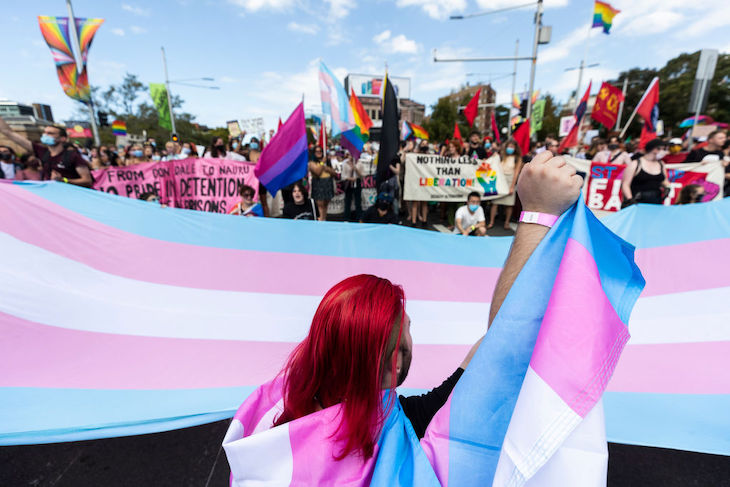When Australian businesswoman Sall Grover set up Giggle – an app exclusively for women – in 2020, it never occurred to her that men identifying as ‘transwomen’ would demand the right to use it.
Today, a landmark case will hit the Federal Court in Sydney, brought by a transwoman called Roxanne Tickle. It will either confirm or challenge the Australian government’s ongoing attempt to banish woman, female, and girl as sex-based categories. In ‘Tickle vs Giggle’, what is at stake is whether individuals should be allowed to self-define as whatever ‘gender identity’ they choose, and whether that identity then trumps biological sex.
On Giggle, women can find a flatmate, or organise social meet-ups. Lesbians use it as a dating site. Or rather, they used to be able to. ‘Thanks to trans activists doing everything they can to shut us down,’ says Grover, ‘the site is currently off-line until after the case is concluded. They have taken away not just a valuable service for women, but my livelihood.’
Grover came under attack as soon as activists noticed that the app was ‘for females only’, and began demanding that Giggle should be ‘trans inclusive’. She says what they meant by that was, ‘Allow men to use the site. We are not allowed anything of our own.’
In February 2021, Grover realised that a man named Roxy Tickle had signed up to the app, and removed him. ‘It was routine to remove the occasional man who got through, plus I’d see the thousands who were denied,’ says Grover.
But Tickle was having none of it. In October that year, he called and messaged Grover’s personal mobile. Grover blocked him, and in December 2021 he filed a complaint with the Australian Human Rights Commission (AHRC), with a lawsuit served on Grover in January 2022.
‘I had said “no” to this man,’ Grover explains, ‘because I wanted to maintain my boundaries.’ Now he is taking her to court in an attempt to make it illegal for women to even have boundaries. Grover tells me that it was terrifying at first, being called a bigot and transphobe, when she had always tried to be a good person, ‘But now, it’s water off a duck’s back.’
Prior to setting up Giggle, Grover was a successful Hollywood screenwriter, but walked away after ten years of systematic sexual harassment and assault. ‘Everything you have heard about the #MeToo era is the truth’ she tells me when we meet during her trip to London.
At one point Grover was offered an out-of-court settlement – on condition that she attend gender identity re-education and open the Giggle app to males. She refused. ‘As if I would destroy the very point of my product – to be a safe space for women and girls, by including men,’ says Grover. ‘Ask yourself, what type of man wants to be lurking around a women-only online space?’
We are told that because ‘trans women’ have an inner ‘feeling’ that they are women, they are entitled to the same unquestioning trust – from women, mothers, lesbians, and children – as biological women.
The punishment for women resisting gender ideology and creating anything exclusively for women is severe, as Grover explains, “Dragging me through this legal battle for over four years is the punishment. One of the worst moments was realising that none of the equity companies would work with us, and that is how we were financing the company. One of them said it’s the ‘trans wound of bad publicity.’
If Tickle wins, it will establish that males have a legal right, not just to the female sex category, but to all female spaces, including hospital wards, sports facilities, domestic violence refuges, rape crisis centres, and prisons. As Grover puts it, ‘if we lose this case, we lose all of women’s rights’. Though she adds, ‘I think it sells the gravity of the issue a little short if we say this is just about women’s rights. Freedom of speech, and freedom of belief and expression is universal and matters to everyone.’
What happened to Sall Grover could easily happen here. If the trans activists at Stonewall had their way, we would already have legal self-identification – where a man could simply declare he is a woman, based on nothing more than a ‘feeling’, and be considered so legally. There would be no thing as biological sex in law, only a chosen gender identity.
Grover does not play down how vulnerable she has felt, even though she has had to communicate ‘utter strength’ throughout. As she tells me, ‘I have effectively lost the job I created. And this is all because a man came after me thinking that he could push me into apologising for not affirming him as a woman.’
And although she understands that women ‘go along with this nonsense because they are frightened’, Grover believes that ‘if we all just stood up and spoke up, this would be over in a week.’ She is determined that her one-year-old daughter will not ‘grow up in a world in which she will have no rights.’
The day I meet Grover, it is announced that the first housing project exclusively for transwomen will be built in Darlinghurst (NSW, Australia), with rents significantly subsidised from public money.
‘Women are not allowed to have anything for us and are called “transphobic” for keeping males out of our spaces, but it is fine for men that claim to be women to have their own housing. How is this right? Who can tell me this is fair?’








Comments